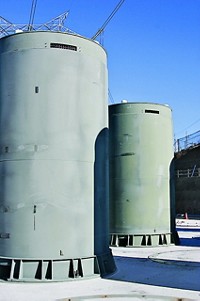Advertisement
Grab your lab coat. Let's get started
Welcome!
Welcome!
Create an account below to get 6 C&EN articles per month, receive newsletters and more - all free.
It seems this is your first time logging in online. Please enter the following information to continue.
As an ACS member you automatically get access to this site. All we need is few more details to create your reading experience.
Not you? Sign in with a different account.
Not you? Sign in with a different account.
ERROR 1
ERROR 1
ERROR 2
ERROR 2
ERROR 2
ERROR 2
ERROR 2
Password and Confirm password must match.
If you have an ACS member number, please enter it here so we can link this account to your membership. (optional)
ERROR 2
ACS values your privacy. By submitting your information, you are gaining access to C&EN and subscribing to our weekly newsletter. We use the information you provide to make your reading experience better, and we will never sell your data to third party members.
Environment
Nuclear Power
by Rudy M. Baum
May 9, 2011
| A version of this story appeared in
Volume 89, Issue 19
This week’s issue contains six letters on nuclear power, a representative sample of the letters C&EN received in response to the editorial, “Resist Hysteria,” I wrote shortly after the earthquake and tsunami in Japan devastated the Fukushima Daiichi Nuclear Power Station (C&EN, March 21, page 5).
Four of the six letters take sharp issue with the primary point I made in the editorial, which was that, despite the severity of the situation in Japan, nuclear power remains an essential component of our overall energy mix for the near to mid-term because it will help us avert the worst impacts of global climate disruption.
The letter writers make a number of points that I think deserve consideration. Two raise the issue of disposal of nuclear waste. Mark Schauer writes: “At this time, no country on the planet has implemented a long-term solution to the problem of nuclear waste. I consider it criminally irresponsible to implement a process where you don’t know what to do with waste that remains hazardous for tens of thousands of years.”
And Gary Katz observes: “The failure to make any progress on nuclear waste disposal worldwide is underscored by the fact that to date only one small country—Finland—has a long-term storage depository constructed and ready for use. … [T]he U.S. government has scuttled two decades of work on its Yucca Mountain depository after an expenditure of many billions of dollars. This leaves all our reactors laden with the same lethal stores of spent fuel as at Fukushima.”
These are legitimate points. Nuclear waste is an intractable problem for which we have not developed an adequate solution.
That said, at least the nuclear waste is in temporary repositories and remains under human control, which is more than can be said of the waste from burning fossil fuel. That would be, for starters, carbon dioxide, the primary greenhouse gas that is inexorably disrupting Earth’s climate. According to the United Nations, carbon dioxide emissions amounted to about 30 billion metric tons in 2007. Straight into the atmosphere. No known way to take it back out again. And it’s going to remain there for thousands of years.
How about mercury? According to the Department of Energy, coal-fired power plants are responsible for putting about 48 tons of the neurotoxic metal into the atmosphere each year worldwide, about one-third of total natural and anthropogenic emissions.
Schauer also raises the environmental damage done by uranium mining. Again, one can’t argue that such damage is insignificant. However, what about the environmental damage associated with fossil-fuel extraction? The Deepwater Horizon oil spill in the Gulf of Mexico last year released 185 million gal of oil, the total impact of which we will probably never know.
Coal? I’m surprised the coal industry hasn’t come up with a suitable euphemism for “mountaintop removal,” the now-preferred method of extracting coal in West Virginia and Kentucky. You blast off the top of a mountain, deposit the debris in streambeds, excavate the coal, and spray some grass seed on the devastation that remains.
Natural gas is the fossil fuel du jour. It’s always described as “clean-burning natural gas” by the industry. And indeed, it does burn cleaner than coal. The reason natural gas has suddenly become so plentiful, however, is the advent of hydraulic fracturing technology for extracting it from beds of shale. There’s quite a bit of controversy about the impact of “fracking” on groundwater.
Nuclear reactors are expensive. People’s fear of radioactivity should not be dismissed. We should be focused on alternative sources of energy. Carbon taxes should be enacted.
All valid points. I’ve said it before: Humanity must learn how to live off the sun in real time. Humans, however, are not going to give up the benefits of modern civilization, which is based on abundant energy supplies. For the next 50 years or so, alternative energy sources cannot fuel civilization. Nuclear power can make a contribution that doesn’t contribute to climate disruption. That’s the reality we face.
Thanks for reading.



Join the conversation
Contact the reporter
Submit a Letter to the Editor for publication
Engage with us on Twitter